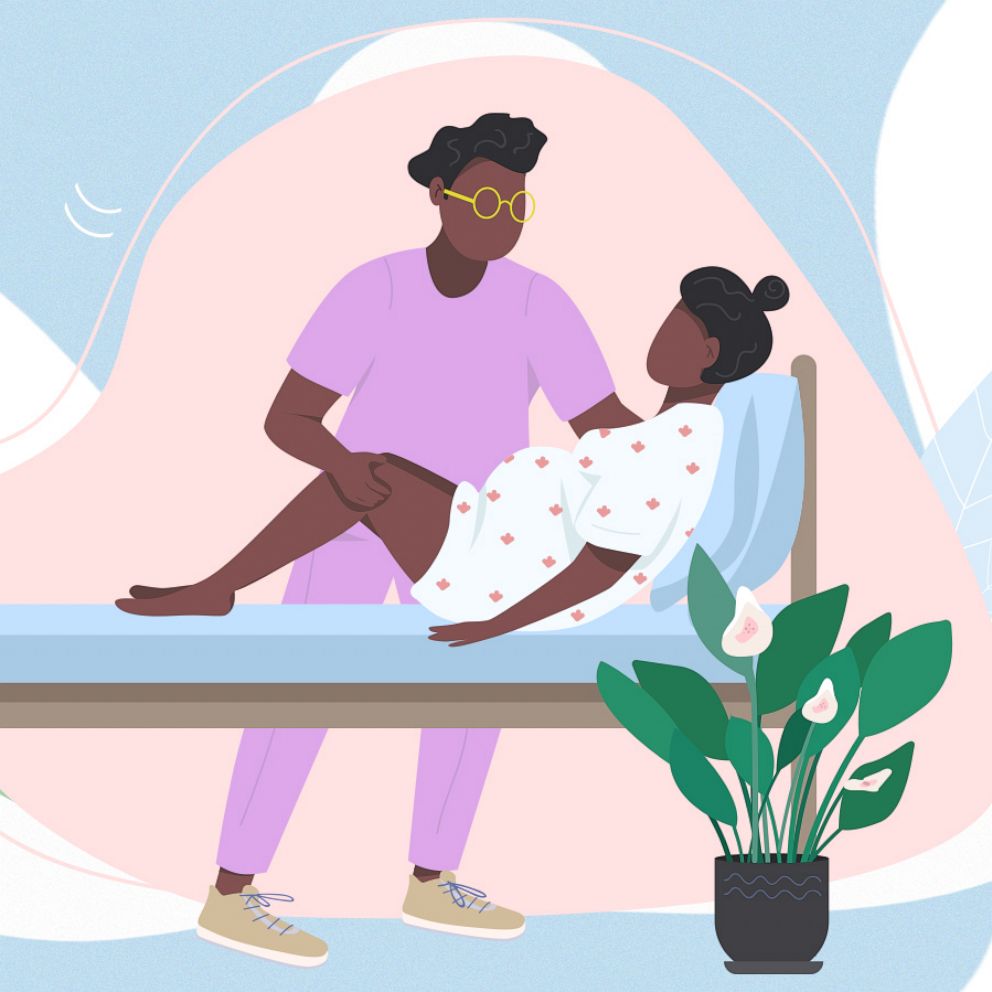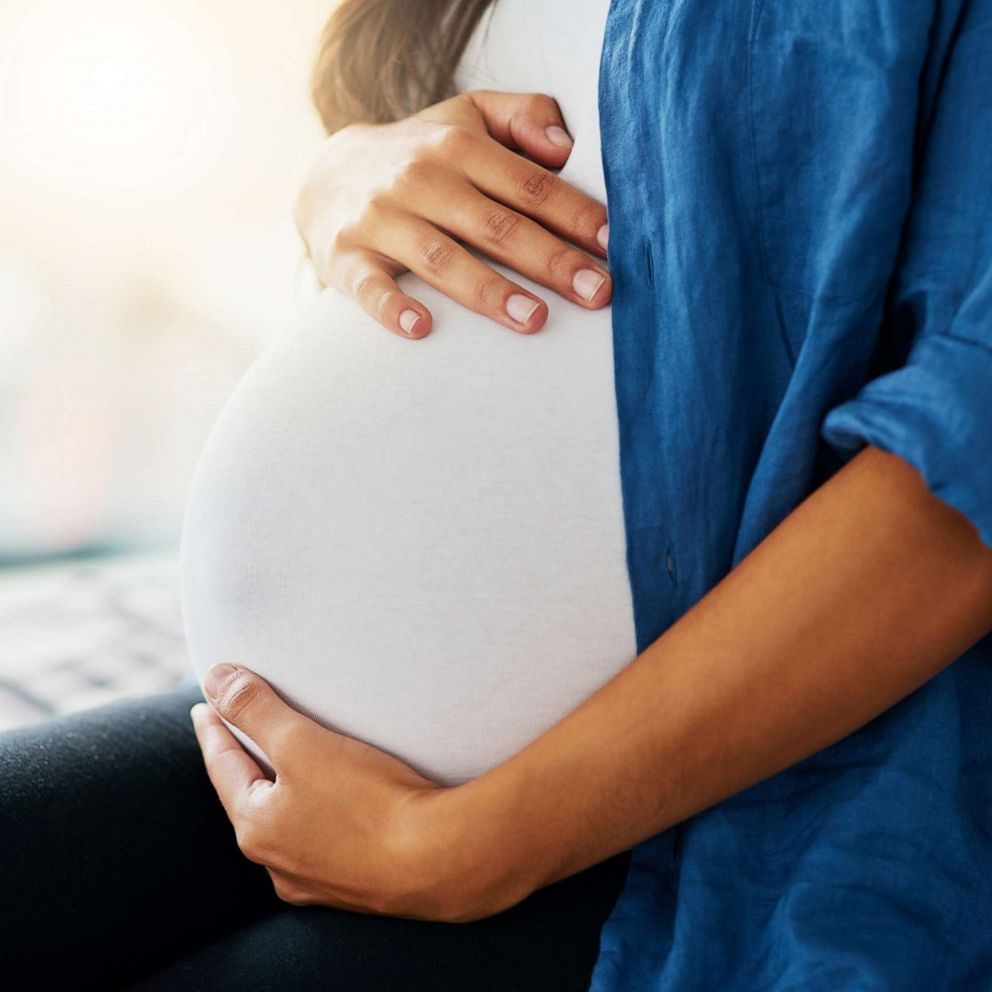2 dads work to end maternal mortality crisis after losing partners to childbirth
The dads are featured in the documentary "Aftershock," now streaming on Hulu.
Bruce McIntyre has spent the past two years raising his son Elias as a single dad after his partner Amber Rose Isaac died following an emergency cesarean section in a New York City hospital.
She died just days after posting on social media about her experience with what she called "incompetent doctors" during her pregnancy.
Omari Maynard is also a single dad, raising his son on his own after his partner Shamony Gibson died 13 days after giving birth in 2019.
"We had three hospital visits between that two-week time frame," Maynard told ABC News' Robin Roberts in an interview that aired Tuesday on "Good Morning America." "We were disregarded until, you know, she had sharp chest pains one day and couldn't make it up the steps."
Since their partners' deaths, McIntyre and Maynard have become vocal forces in the fight to raise awareness and end the Black maternal health crisis in the United States.
Their stories are featured in the new Hulu documentary, "Aftershock," which explores the disparities Black women face giving birth in the U.S.
"As a single parent, you still want to honor your partner the best ways possible," McIntyre told Roberts of his activism.
Added Maynard, "Losing your partner but then having to turn around and change diapers and still provide, it's overwhelming."
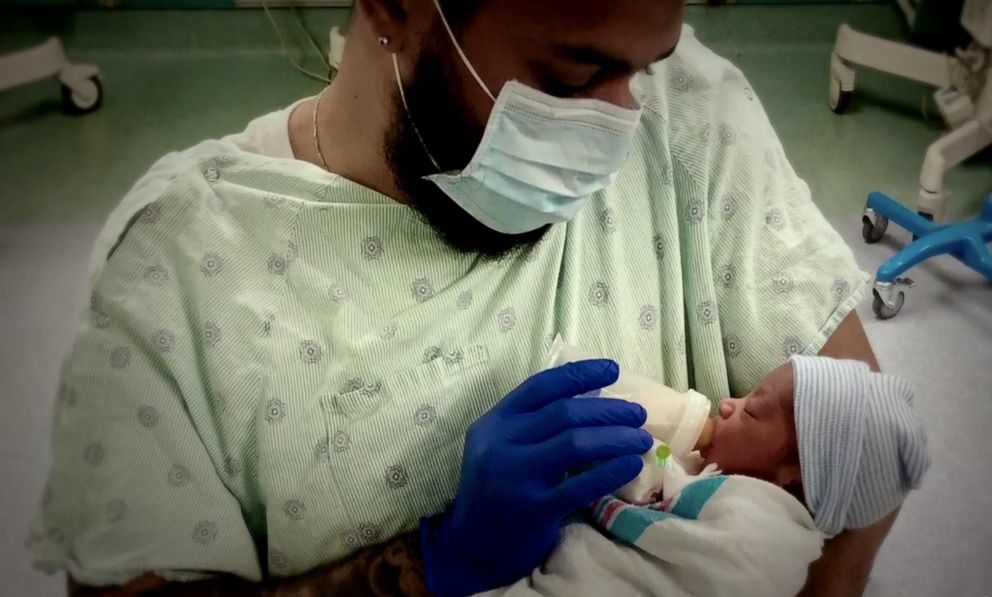
In 2020, over 800 women died of maternal causes in the U.S., which continues to have the highest maternal mortality rate among developed nations, according to the U.S. Centers for Disease Control and Prevention.
Black women in the U.S. die of maternal causes at nearly three times the rate of white women, according to CDC data released in February.
Pregnancy-related deaths are defined as the death of a woman during pregnancy or within a year of the end of pregnancy from pregnancy complications, a chain of events initiated by pregnancy or the aggravation of an unrelated condition by the physiological effects of pregnancy, according to the CDC.
Maynard said his partner, Gibson, complained of chest pain in the days after giving birth. After several hospital visits, she suffered a pulmonary embolism, a blood clot in her lungs, which her family claims was treatable.
Gibson's mother, Shawnee Benton, a reproductive rights activist, said she now realizes the reality of the obstacles her daughter faced as a Black woman giving birth.
"I felt guilty but then I realized she's a Black woman and I talk about this all the time. Why would my daughter be exempt?" she told Roberts, adding, "Our wombs create worlds. If we can't trust and believe that we can birth safely, what are we saying about the planet?"
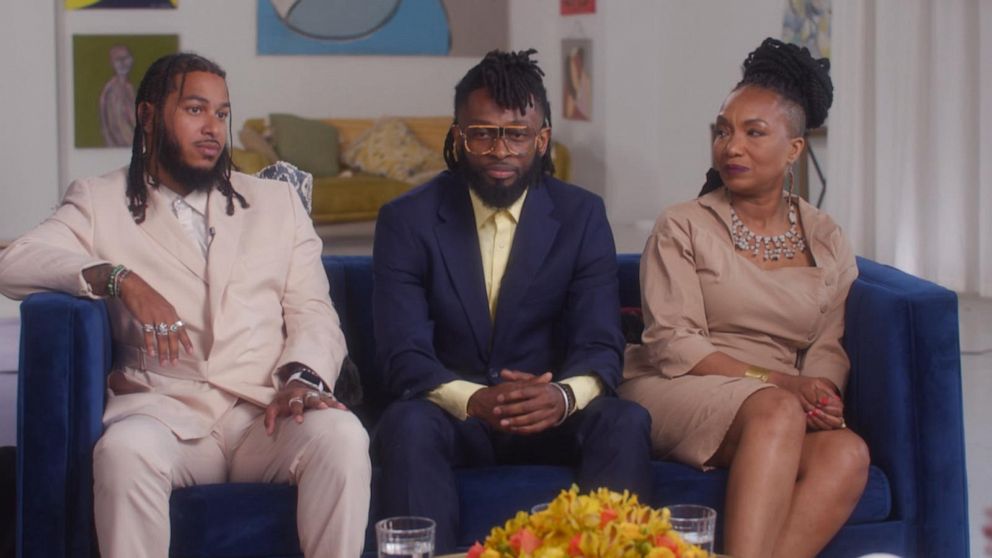
McIntyre said his partner, Isaac, had high-risk symptoms for several months of her pregnancy that he said were ignored.
"She was having chest pains, was unable to breathe, barely being able to make it down the block," he said, adding what he claims was the hospital's response, "They're delaying information. They're losing information, losing blood work. Not giving her any type of clear answers."
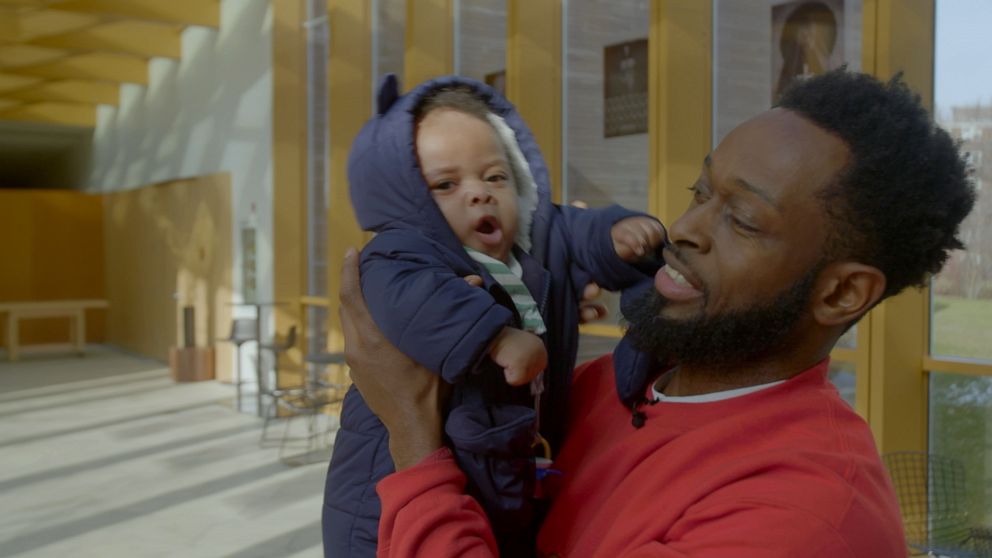
Isaac's family is currently in an ongoing lawsuit with the hospital where she died, Montefiore Medical Center in the Bronx.
The hospital, which has denied any wrongdoing, told ABC News in 2020, "Ninety-four percent of our deliveries are minority mothers, and Montefiore's maternal mortality rate of 0.01 percent is lower than both New York City and national averages. Any maternal death is a tragedy."
McIntyre said it was a midwife who raised the alarms that Isaac was not doing well, which he said prompted his efforts to now open a birthing center in the Bronx with access to midwifery and doula care.

Aftershock
Following the deaths of two young women due to childbirth complications, two bereaved families galvanize activists, birth workers, and physicians to reckon with one of the most pressing American crises today: the U.S. maternal health crisis.
As the maternal mortality crisis has deepened in the U.S., doulas -- trained professionals who provide support to moms before, during and after childbirth -- have become seen, especially for Black women, as potentially lifesaving advocates during birth.
"Black women hire doulas because they want to make sure that they live," Tracie Collins, a doula and CEO and founder of the National Black Doulas Association, a nonprofit organization that connects Black birthing families with Black doulas, told ABC News last year. "It's not a status quo for us."
Dr. Ashanda Saint Jean, a board-certified OBGYN and chair of OBGYN for the Health Alliance Hospitals and Westchester Center Medical Health Network in New York, noted to ABC News that doulas are a source of non-medical support for pregnant women before, during and after childbirth.
"A doula is a support person who has been trained and educated in labor and delivery," said Saint Jean. "I've had a number of Black patients feel that having a doula is an extra layer of support where they're able to more ask questions about their birthing experience and explore all measures to ensure a healthy outcome."
Why exactly Black women die at a higher rate than any other race during childbirth is the result of a web of factors, experts say.
One reason for the disparity is that more Black women of childbearing age have chronic diseases, such as high blood pressure and diabetes, which increases the risk of pregnancy-related complications like preeclampsia and possibly the need for emergency C-sections, according to the CDC.
But there are socioeconomic circumstances and structural inequities that put Black women at greater risk for those chronic conditions, data shows. And Black women often have inadequate access to care throughout pregnancy, which can further complicate their conditions, according to a 2013 study published in the American Journal of Obstetrics and Gynecology.
Anecdotal reports show that the concerns of Black women experiencing negative symptoms during pregnancy and postpartum are specifically ignored by some physicians until the woman's conditions significantly worsen, at which point it may be too late to prevent a deadly outcome.
Behind the statistics of maternal mortality are real people, whose families mourn what could have been.
"It's very bittersweet," said McIntyre, adding that Isaac hoped to become an educator and open her own school. "Elias has her smile. It takes me back a lot."
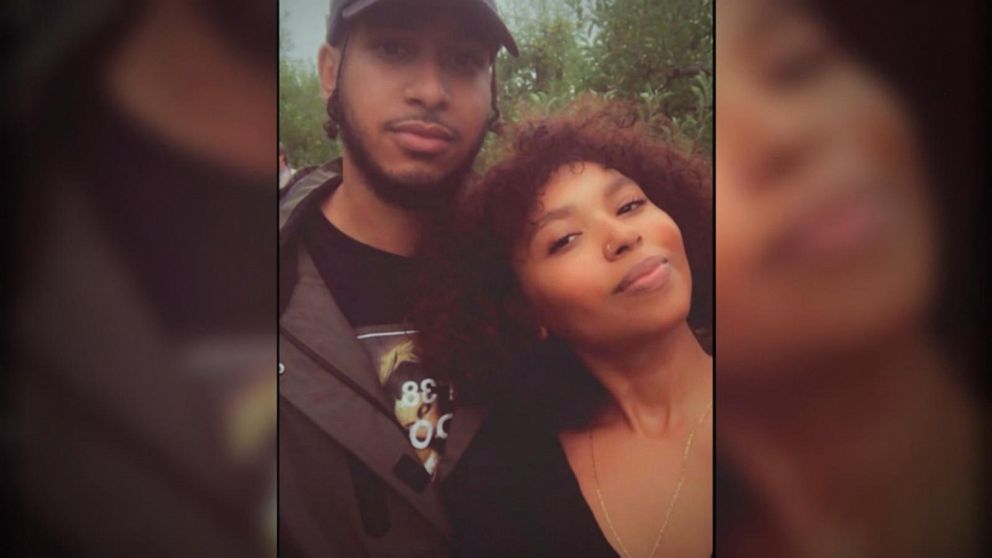
After Gibson's death, Maynard began to paint portraits as presents for people who also lost a loved one due to the maternal mortality crisis.
"When I provide these pieces of art to families, it allows for a different type of connection," he said.
Gibson was a choreographer who was described as "funny, fiery, over-the-top," by her mom, Benton.
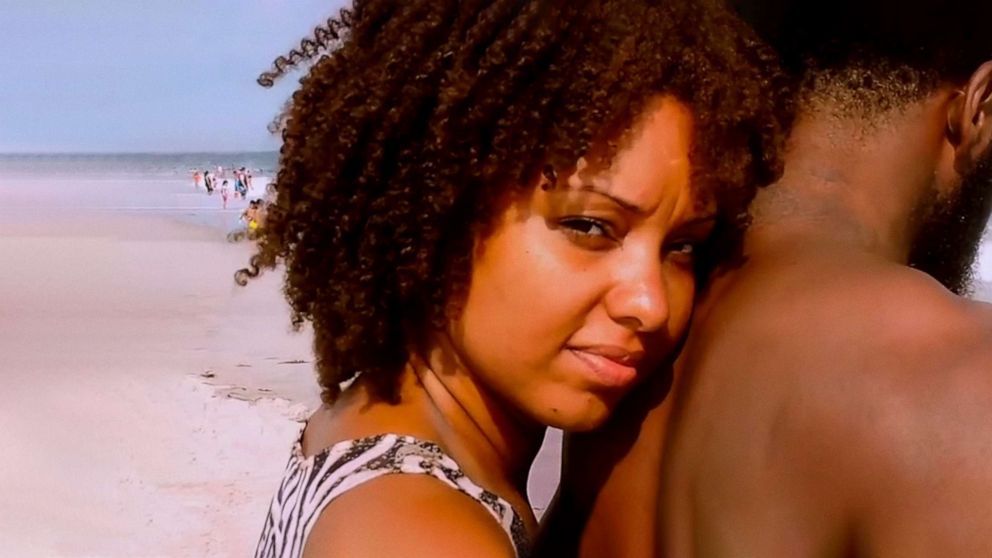
"She lived 11,200 and some odd days. She died one day. That one day doesn't get to take the essence of her life away," said Benton. "So my daughter lives, and we're sitting here because of her."
"Aftershock," an original documentary from Onyx Collective and ABC News, is now streaming on Hulu.

